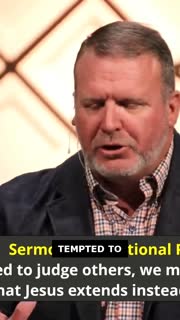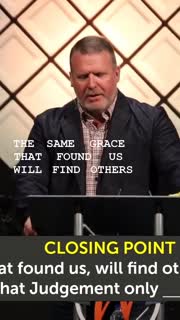Grace Over Judgment: Embracing Spiritual Growth
Devotional
Sermon Summary
Bible Study Guide
Sermon Clips
1. "When the penalty flags of life come into our lives, we must view them through the lens of God's grace and not His condemnation. You see, because it's through His love that He disciplines us. It's through His love that He throws those proverbial flags upon our lives. You see, just like in football, where there's a penalty flag, is a call that addresses a certain violation to the game. Well, you see, our spiritual penalty flags are opportunities for us to recognize our missteps, and to receive correction, discipline, and the love of Jesus Christ." [35:21] (34 seconds)
2. "In this life, there are penalties for offenses, but we must receive the penalties as a form of grace and not condemnation. You see, don't get mad when God chastens us. Look at that as an opportunity that He is expressing His love to you so we don't have as many flags thrown on the plays of our lives. This is a blessing. And I'm going to tell you why it's a blessing, because God never will go against His self in Scripture." [36:24] (26 seconds)
3. "Therefore, there is now no condemnation for those who are in Christ Jesus. No condemnation for those who are washed in the blood of the Lamb. There is no condemnation for those who have placed their faith and trust in the loving Savior who went to Calvary's cross and died for our sins. There is no condemnation on those who are in Christ Jesus. You see, this means that the penalties that we face are not meant to condemn us, but they're meant to guide us under the picture of His grace that was bestowed upon for us on Calvary's cross." [36:57] (31 seconds)
4. "When we are tempted to judge others, we must stop and consider the grace that Jesus extends instead of judgment. We've got to understand that when we are tempted to judge others, when God's got that penalty flag and He's like, go ahead and do it, boy, I'm going to hit you with this. We've got to understand that it's not to beat us down, to tear us up. It is a picture of discipline because He loves us through the vessel of His grace." [49:11] (26 seconds)
5. "Do not judge. Or you too will be judged. For in the same way you judge others you will be judged. And with the same measure you use it will be measured to you. Man, this is one of the hardest things for Christians today. Why do you look at the speck of sawdust in your brother's eye and pay no attention to the plank in your own eye? How can you say to a brother, let me take the speck out of your eye when all the time there is a plank in your own eye?" [55:01] (36 seconds)
6. "The same grace that found us will find others through us as long as we recognize that judgment only hinders this process. May the grace of God that found you find others through you. We all want that, but it is not going to happen when we live our hearts and our lives with a very sense of judgment about people, when we're hypocritical. The same grace that found us will find others through us as long as we recognize that judgment only hinders the process." [01:01:50] (35 seconds)
7. "When you see a flag thrown and you're beginning to think this isn't fair, this is fair. What are we going to do? Because it's kind of like the game on Monday night, you know, when the whole toe issue right on the end. What was the end result of that? Well, during a game when a flag's on the ground, someone's being called out because of an infraction. We know that. And that infraction, whatever it may be, is always at the discretion of the judge. And the referee might say something like this. Fault start on the offense. And he'll point out number 75. Five yard penalty. Repeat the down." [01:04:01] (38 seconds)
8. "But let me tell you how this works for the Christian. Let me tell you how this works for those. The scripture says there is no condemnation for those who are under Christ Jesus. That flag's laying on the field, right? And while that flag's there, another referee comes over to that referee and he whispers something into his ear. And then that referee says this. He says the following, or the previous penalty is under review. And guys, this is where it gets so good in the analogy of the football field is that what they do is they reach out and they make a phone call to somebody who's perched up in a higher seat a higher elevation who could see the entire field." [01:05:02] (41 seconds)
9. "And I love this when it comes back and we've watched the replay and we want righteousness. We want the right play to be called. And I love when the referee comes back out on the field and he'll take the flag and he'll do something like this. And he says these words, and I love this, upon further review the penalty on the field is taken away. First and ten. And it's a small picture of victory. You see, not because they weren't found guilty, not because they weren't condemned, but because the man upstairs looked down and when he looked down, he couldn't see the violation, he couldn't see the sin. You know what he could see? The blood of Jesus that was covering that offense." [01:06:06] (47 seconds)
10. "If you've never received Christ and you're tired of playing on defense and you're tired of living this life of condemnation, condemnation, today's the day for you to be washed in the blood of the Lamb. That way when God looks down, he can say those words upon further review. That call on the field, it's been overturned. Are you being condemned? Just come to Jesus. And for the Christians who are being condemned, Jesus would simply say this, what condemnation? I don't see any condemnation. paid for that when I gave my life. He paid for that for you and you and you and you and everyone in here." [01:08:42] (39 seconds)
Ask a question about this sermon
2. "In this life, there are penalties for offenses, but we must receive the penalties as a form of grace and not condemnation. You see, don't get mad when God chastens us. Look at that as an opportunity that He is expressing His love to you so we don't have as many flags thrown on the plays of our lives. This is a blessing. And I'm going to tell you why it's a blessing, because God never will go against His self in Scripture." [36:24] (26 seconds)
3. "Therefore, there is now no condemnation for those who are in Christ Jesus. No condemnation for those who are washed in the blood of the Lamb. There is no condemnation for those who have placed their faith and trust in the loving Savior who went to Calvary's cross and died for our sins. There is no condemnation on those who are in Christ Jesus. You see, this means that the penalties that we face are not meant to condemn us, but they're meant to guide us under the picture of His grace that was bestowed upon for us on Calvary's cross." [36:57] (31 seconds)
4. "When we are tempted to judge others, we must stop and consider the grace that Jesus extends instead of judgment. We've got to understand that when we are tempted to judge others, when God's got that penalty flag and He's like, go ahead and do it, boy, I'm going to hit you with this. We've got to understand that it's not to beat us down, to tear us up. It is a picture of discipline because He loves us through the vessel of His grace." [49:11] (26 seconds)
5. "Do not judge. Or you too will be judged. For in the same way you judge others you will be judged. And with the same measure you use it will be measured to you. Man, this is one of the hardest things for Christians today. Why do you look at the speck of sawdust in your brother's eye and pay no attention to the plank in your own eye? How can you say to a brother, let me take the speck out of your eye when all the time there is a plank in your own eye?" [55:01] (36 seconds)
6. "The same grace that found us will find others through us as long as we recognize that judgment only hinders this process. May the grace of God that found you find others through you. We all want that, but it is not going to happen when we live our hearts and our lives with a very sense of judgment about people, when we're hypocritical. The same grace that found us will find others through us as long as we recognize that judgment only hinders the process." [01:01:50] (35 seconds)
7. "When you see a flag thrown and you're beginning to think this isn't fair, this is fair. What are we going to do? Because it's kind of like the game on Monday night, you know, when the whole toe issue right on the end. What was the end result of that? Well, during a game when a flag's on the ground, someone's being called out because of an infraction. We know that. And that infraction, whatever it may be, is always at the discretion of the judge. And the referee might say something like this. Fault start on the offense. And he'll point out number 75. Five yard penalty. Repeat the down." [01:04:01] (38 seconds)
8. "But let me tell you how this works for the Christian. Let me tell you how this works for those. The scripture says there is no condemnation for those who are under Christ Jesus. That flag's laying on the field, right? And while that flag's there, another referee comes over to that referee and he whispers something into his ear. And then that referee says this. He says the following, or the previous penalty is under review. And guys, this is where it gets so good in the analogy of the football field is that what they do is they reach out and they make a phone call to somebody who's perched up in a higher seat a higher elevation who could see the entire field." [01:05:02] (41 seconds)
9. "And I love this when it comes back and we've watched the replay and we want righteousness. We want the right play to be called. And I love when the referee comes back out on the field and he'll take the flag and he'll do something like this. And he says these words, and I love this, upon further review the penalty on the field is taken away. First and ten. And it's a small picture of victory. You see, not because they weren't found guilty, not because they weren't condemned, but because the man upstairs looked down and when he looked down, he couldn't see the violation, he couldn't see the sin. You know what he could see? The blood of Jesus that was covering that offense." [01:06:06] (47 seconds)
10. "If you've never received Christ and you're tired of playing on defense and you're tired of living this life of condemnation, condemnation, today's the day for you to be washed in the blood of the Lamb. That way when God looks down, he can say those words upon further review. That call on the field, it's been overturned. Are you being condemned? Just come to Jesus. And for the Christians who are being condemned, Jesus would simply say this, what condemnation? I don't see any condemnation. paid for that when I gave my life. He paid for that for you and you and you and you and everyone in here." [01:08:42] (39 seconds)










